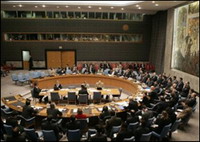UN member states stand for promoting diversity and dialogue
U.N. meeting highlighted urgent need to address rising cultural and religious tensions by promoting diversity and dialogue.

"It is time to promote the idea that diversity is a virtue, not a threat," was said during the U.N. General Assembly's first high-level dialogue on intercultural and interreligious understanding and cooperation for peace.
Ban Ki-moon said that while traveling the globe since taking office on Jan. 1, he has too often found that people are longing for peace but suffering from prejudice because of their ethnicity, skin color, cultural or linguistic background and "above all" their religion.
"It is time to explain that different religions, belief systems and cultural backgrounds are essential to the richness of the human experience," Ban said.
The General Assembly, with its 192 member states, provides a unique forum for exchange among countries, religions and cultures, he said.
General Assembly President Srgjan Kerim opened the two-day session stressing the U.N.'s "crucial role" in promoting talks and "advancing the fundamental freedom that we must all respect others' religions and beliefs."
"To make peace, some people believe that you need to forget," he said. "From my own experience, I would suggest that reconciliation is a fair compromise between remembering and forgetting."
Kerim was foreign minister of Macedonia, one of the independent countries formed after the breakup of the former Yugoslavia.
Kerim said what is needed is intensive dialogue at the political, cultural and social levels. He also suggested that governments adopt educational curriculums that instill values of peace and tolerance.
"Children are not born with prejudice, it is learned," Kerim said.
Karen Hughes, the U.S. undersecretary of state for public diplomacy, said, "Faith is foundational in many people's lives, and world leaders would not be wise to ignore its power or cede its discussion to extremists."
She said that she believes the vast majority of people of every faith and culture share the same human dreams: "education and health care, a safe neighborhood, a good job, and most people want their lives to make a difference."
"Yet, we live in a world where misunderstanding and mistrust are being inflamed by rhetoric of hate and acts of terror," she said.
Philippines Vice President Manuel de Castro Jr. said his country has "had its share of problems related to diverse ethnic and religious minority populations," but did not mention continuing clashes between Philippine troops and suspected Muslim militants on southern islands
De Castro called on U.N. member states to adopt a common plan of action with "policies and programs to promote and protect the rights of indigenous peoples, and encourage interfaith centers in schools."
Pakistan's U.N. Ambassador Munir Akram said that "misunderstanding and friction between cultures and civilizations are not the result of religious differences. They arise from divergent political perspectives on some important issues such as the crises in the Middle East."
Akram said there are perceptions in the West about Islam, "which is seen as a faith propagating terrorism and extremism and bent upon striking at Western values."
"Islam is not a threat to the Western civilization," he said, suggesting that in order to combat such perceptions, each country should promote conscious action to counter extremism within its society.
At the international level, Akram called for equitable economic development and an end to the exploitation of the natural resources of developing countries.
Bosnia and Herzegovina's Foreign Minister Sven Alkalaj said people today "are fully aware that there is no prosperous future without a true reconciliation, tolerance, mutual respect and understanding."
Bosnia has been divided into two mini-states - one for Christian Orthodox Serbs and the other shared by Muslims and Roman Catholic Croats - since the 1992-95 war.
Alkalaj emphasized the importance of teaching children everywhere to be tolerant and to respect and appreciate diverse cultures and religions.
"But teaching our children will mean nothing if we don't lead by example," Alkalaj said.
Subscribe to Pravda.Ru Telegram channel, Facebook, RSS!





